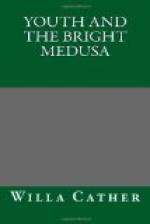The final number was made up of modern French songs which Kitty sang enchantingly, and at last her frigid public was thoroughly aroused. While she was coming back again and again to smile and curtsy, McKann whispered to his wife that if there were to be encores he had better make a dash for his train.
“Not at all,” put in Mrs. Post. “Kitty is going on the same train. She sings in Faust at the opera tomorrow night, so she’ll take no chances.”
McKann once more told himself how sorry he felt for Post. At last Miss Ayrshire returned, escorted by her accompanist, and gave the people what she of course knew they wanted: the most popular aria from the French opera of which the title-role had become synonymous with her name—an opera written for her and to her and round about her, by the veteran French composer who adored her,—the last and not the palest flash of his creative fire. This brought her audience all the way. They clamoured for more of it, but she was not to be coerced. She had been unyielding through storms to which this was a summer breeze. She came on once more, shrugged her shoulders, blew them a kiss, and was gone. Her last smile was for that uncomfortable part of her audience seated behind her, and she looked with recognition at McKann and his ladies as she nodded good night to the wooden chairs.
McKann hurried his charges into the foyer by the nearest exit and put them into his motor. Then he went over to the Schenley to have a glass of beer and a rarebit before train-time. He had not, he admitted to himself, been so much bored as he pretended. The minx herself was well enough, but it was absurd in his fellow-townsmen to look owlish and uplifted about her. He had no rooted dislike for pretty women; he even didn’t deny that gay girls had their place in the world, but they ought to be kept in their place. He was born a Presbyterian, just as he was born a McKann. He sat in his pew in the First Church every Sunday, and he never missed a presbytery meeting when he was in town. His religion was not very spiritual, certainly, but it was substantial and concrete, made up of good, hard convictions and opinions. It had something to do with citizenship, with whom one ought to marry, with the coal business (in which his own name was powerful), with the Republican party, and with all majorities and established precedents. He was hostile to fads, to enthusiasms, to individualism, to all changes except in mining machinery and in methods of transportation.
His equanimity restored by his lunch at the Schenley, McKann lit a big cigar, got into his taxi, and bowled off through the sleet.
There was not a sound to be heard or a light to be seen. The ice glittered on the pavement and on the naked trees. No restless feet were abroad. At eleven o’clock the rows of small, comfortable houses looked as empty of the troublesome bubble of life as the Allegheny cemetery itself. Suddenly the cab stopped, and McKann thrust his head out of the window. A woman was standing in the middle of the street addressing his driver in a tone of excitement. Over against the curb a lone electric stood despondent in the storm. The young woman, her cloak blowing about her, turned from the driver to McKann himself, speaking rapidly and somewhat incoherently.




